Review for Horimiya - The Complete Season
Introduction
I’m a lot more discriminating now when it comes to the new anime that I watch of late. The sense that I don’t want to watch something I’ve already seen in another form makes me reluctant to binge anime the way I used to. That’s something I really take into account when perusing Crunchyroll’s release schedule in the UK. They’re a company that seem to target the mass audience, lowest common denominator shows, leaving their quirkier releases for the US, where smaller margins are still significant enough to potentially sell out Blu-ray print runs. But I’m sifting through their UK releases, discounting the isekai (lost in another world) shows, the long running shonen action series, and then I check the blurb to see if I’ve already got shows in that genre. That doesn’t leave too many options when all is said and done.
I’m certainly not short of romantic comedies when it comes to anime, but Horimiya turns out to be not a harem comedy where a milquetoast male central lead somehow attracts every suitable female within range of his questionable charms (you can tell that I’m in one of my cynical moods today). Horimiya is a more conventional romantic comedy that develops a relationship between one boy, and one girl, in one of those ‘opposites attract’ deals. What’s normal for most other media is still exceptional when it comes to anime, rare enough to still be worthy of attention.
In school, Kyoko Hori is the class princess, outgoing and friendly, and the centre of attention. Her personality shifts when she gets home, focused on doing the chores, and doting on her little brother Sota. In class, Izumi Miyamura is the outsider, shrouded in gloom, and buried under layers of clothing and behind glasses. Outside of school, he ties his hair back, shows of his piercings, and dresses lightly enough to show off his tattoos; totally stylish. The class princess never really paid attention to the gloomy loner, but when the homebody meets the style icon, both of their lives will change...
13 episodes of Horimiya are presented across two Blu-rays from Crunchyroll.
Disc 1
1. A Tiny Happenstance
2. You Wear More Than One Face
3. That’s Why It’s Okay
4. Everybody Loves Somebody
5. I Can’t Say It Out Loud
6. This Summer’s Going To Be a Hot One
7. You’re Here, I’m Here
Disc 2
8. The Truth Deception Reveals
9. It’s Hard But Not Impossible
10. Until the Snow Melts
11. It May Seem Like Hate
12. Hitherto, and Forevermore
13. I Would Gift You the Sky
Picture
Horimiya gets a 1.78:1 widescreen 1080p transfer across these discs. The image is clear and sharp, and presents the animation with rich and consistent colours and a minimum of compression artefacts or digital banding. The animation is a solid one, with distinctive and memorable character designs and a comfortable world design. It’s not an animation that has too many bells and whistles, but it does more than enough to tell the story and add a few flourishes.
Sound
Horimiya offers Dolby TrueHD 2.0 Stereo English and Japanese with optional English subtitles and a signs only track. The audio is fine, the dialogue is clear and the subtitles timed accurately and free of typos. The actors are suited well to the characters in the Japanese version that I watched, and the show gets some nice music to drive the narrative and bookend the episodes.
Extras
You get two discs in a BD Amaray style case, one on each inner face. There’s art on the inner sleeve to appreciate, and the discs boot to static menus. Each episode is followed by a translated English credits scroll.
The extras are on disc two...
Horimiya Voice Actor Panel (33:05)
Web Previews (6:41)
Promo Videos (3:41)
Commercials (1:21)
Textless Credits - 2 OP and 2 ED
Conclusion
Horimiya is an interesting and entertaining romantic comedy, which somehow blends a degree of originality with plenty of the usual anime tropes, yet still gets away with it to feel fresh and new in a genre that typically follows strict formulae. It’s certainly not a harem comedy, which is enough of a departure to make the show worth watching, but it also tells a progressive story, introducing the characters, getting them together, and developing a relationship to a logical stopping point where you can pause to take stock of the journey the two protagonists have been on. It’s still not unique as a genre type, and my go to for this kind of show will still be Toradora, but Horimiya has a greater sense of reality to it that offsets the occasional silliness and gives it a verisimilitude that sets the show apart.
The show really works because of the two central, multifaceted characters. On the surface, Hori is a typical class princess, a little aloof and the centre of attention while Miyamura is the typical lone wolf, long hair and glasses and an ‘avoid me’ aura. Circumstances put the two into a mutual orbit, when Miyamura helps Hori’s kid brother Sota home after he has a little accident, and winds up staying for tea. Outside of school, Miyamura reveals his ‘true’ self, piercings and tattoos, and that’s enough to get Hori’s attention, who at home is more of a responsible mum figure rather than anything too stylish. Sota quickly takes a shine to ‘big brother’ Miyamura and wants him to keep visiting, and it isn’t long before the penny drops for Hori and she realises that the stylish and cool Miyamura is the same lone wolf Miyamura who hides away in class. She isn’t the kind of shallow person who would avoid him for that reason, and she’s the first person to talk to him in class, bringing him into her circle of friends.
So Miyamura starts to open up, and it turns out the piercings and the body art is to compensate for a severely introverted nature, which stems from a childhood of ostracism and being bullied. At first he can’t even accept the idea that Hori is interested in him, until she gets mad at him for matchmaking between her and her friend Ishikawa. As the show unfolds, their relationship develops with the usual ups and downs, and while Miyamura goes on a process of healing, often haunted by his past, morose self, we get to see just how quirky and out there Hori is as well. One of the oddest choices is that she has a bit of a bad boy fetish, and convinces Miyamura to talk down to her, even deliver the occasional slap. This only works in the context of the comedy, as his instinct is for contrition following such role-play, and it does set up a brilliant gag when he encounters one of his childhood bullies later in the show,
Of course the show can’t rest on the shoulders of just two characters alone, and we get introduced to many others in their school, their classmates, Hori’s close friends who become Miyamura’s friends as well, the members of the student council, and so on. Some are there for comic relief, and others have relationship issues as well that develop as the series unfolds. With Hori such a popular girl in class, it isn’t surprising that Miyamura finds rivals for her affection, although she winds up dealing with such issues a lot more effectively than he can.
The way that the central relationship develops in Horimiya does much to endear it to me, realistic enough to help invest in the characters, while playing light enough to not overly tax the emotions. The teenage characters in the show are written well enough, but the weakness is in the adults, with Hori’s father little more than childish comic relief, while her mother only registers when the story demands, and the series is bookended by a skeevy schoolteacher who thankfully vanishes for the majority of the episodes. The presentation on the Blu-ray is solid enough, although Crunchyroll can’t even be bothered to localise the credit sequences any more, the way they used to when they were Funimation.
Horimiya is available from Anime on Line, from Anime Limited, and mainstream retailers.
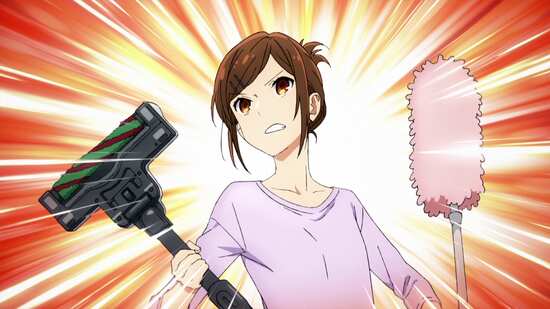
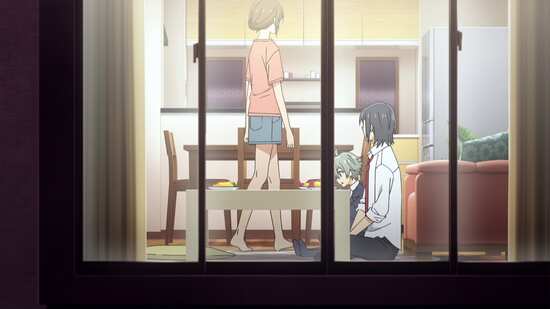
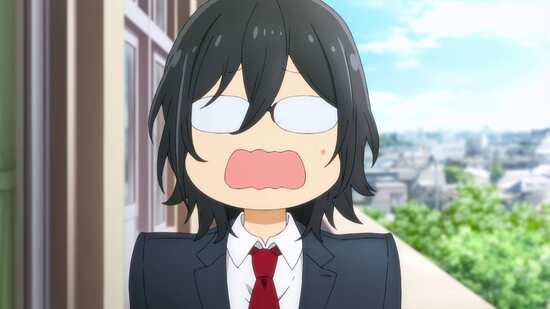
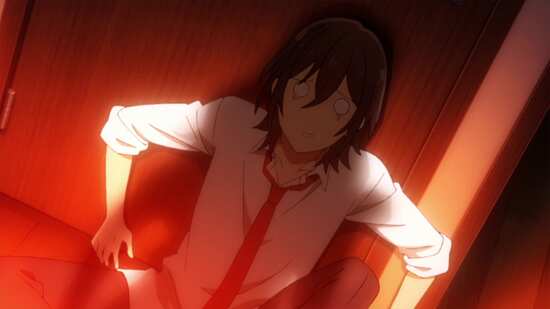
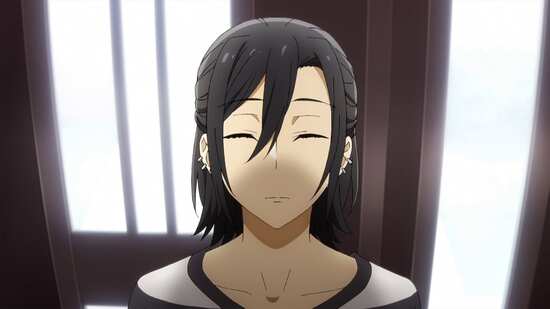
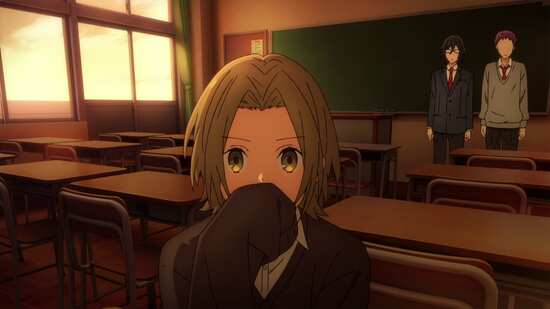

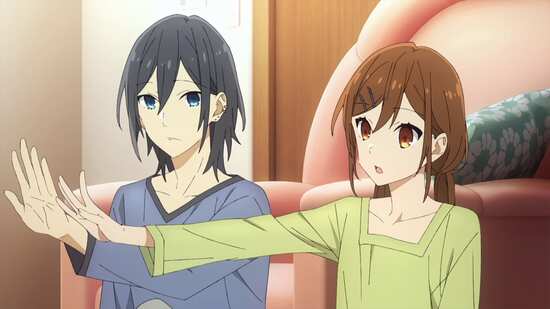
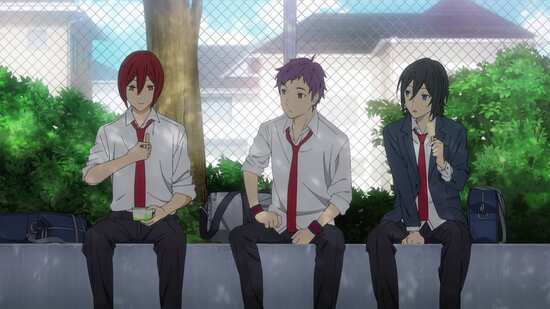
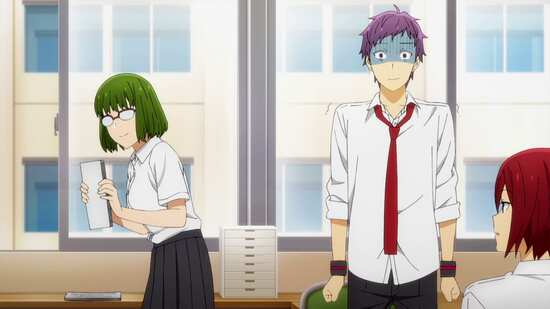
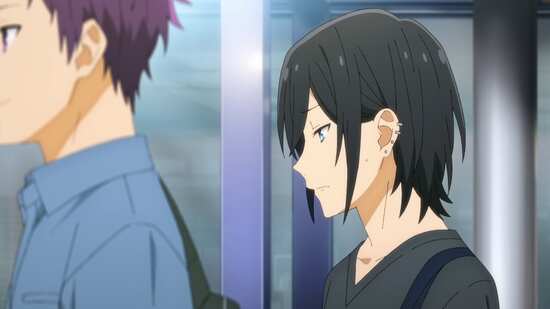

Your Opinions and Comments
Be the first to post a comment!